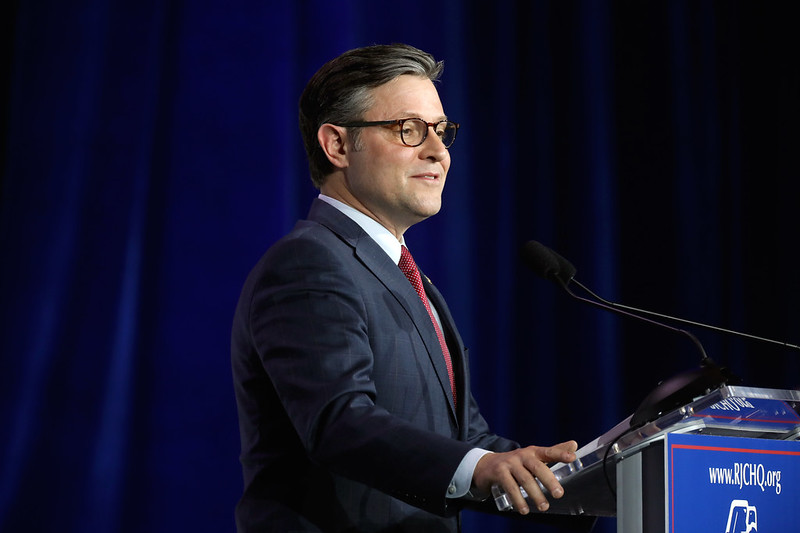Rights groups are particularly concerned about reporting that parts of the debate could be held in “secret session.”
By Jessica Corbett. Published 2-12-2024 by Common Dreams

Privacy rights advocates and experts are sounding the alarm this week as members of the U.S. House of Representatives dive back into a contentious battle over reforming warrantless government surveillance powers that historically have been abused and consider closed-door debate.
House Republicans on Monday unveiled the Reforming Intelligence and Securing America Act and announced that the Committee on Rules will meet Wednesday to discuss the bill, which combines two previously competing proposals focused on Section 702 of the Foreign Intelligence Surveillance Act (FISA).
Section 702—which Congress temporarily extended with an annual defense package in December—only allows warrantless surveillance targeting foreigners located outside the United States, but Americans’ data is also collected, and several agencies including the Federal Bureau of Investigation (FBI) have been widely lambasted for misusing it.
The new bill “more closely aligns with the original proposal from the House Intelligence Committee over that of its Judiciary competitor, focusing on more reforms at the FBI to address misuse of the powerful spy tool,” according to The Hill. “But it does not include Judiciary’s hope for a warrant requirement—something deemed a red line for the intelligence community but nonetheless a top priority for privacy advocates in Congress.”
The outlet also noted that “the process of bringing the bill to the floor will push the House to return to a previously floated idea from Speaker Mike Johnson (R-La.) to do a queen-of-the-hill-style debate format that would allow for consideration of amendments—including a potential amendment on a warrant requirement.”
And it’s not just us — Americans overwhelmingly support these reforms. For example, nearly 80% support for closing the data broker loophole. (6/x)https://t.co/ReQdTSGWXy
— EPIC (@EPICprivacy) February 12, 2024
Also stressing the divisiveness of the warrant policy, Wired detailed Monday:
Several aides attributed the drawn-out nature of the fight, at least in part, to the relative naivete of the House speaker on national security matters, saying that, with little experience in the area, Johnson had not previously had the opportunity to be captured by the intelligence community—powerful interests accused by congressional staffers of routinely deploying “fear tactics” to defend surveillance operations plagued by regular error and abuse.
Johnson’s lack of any intelligence background, staffers say, would have likely increased his dependence on House intelligence staffers, who, while cultivating a sense of awe due to their access to national secrets, routinely behave as ambassadors between the spy agencies and regular congressional staff.
Privacy advocates inside and outside the House continue to emphasize the need for a warrant requirement. They are also concerned about reporting from Politico‘s Jordain Carney late Sunday that some debate may occur in “secret session.”
Yup, you're reading that right.
— Project On Government Oversight (@POGOwatchdog) February 12, 2024
Members of Congress are considering a "secret session" to discuss reauthorizing surveillance powers. This secrecy goes against the core principles of democracy.
🚨Call your member of Congress NOW to tell them to debate in the open 📞202-224-3121. https://t.co/GD89l25PSq
“Most lawmakers want major reform of Section 702. The Judiciary Committee’s reform bill passed out of committee on a 35-2 vote,” said Elizabeth Goitein, senior director of the Brennan Center for Justice’s Liberty & National Security Program. “Intelligence Committee leaders know they can’t win on an even playing field, so they’re trying to use secrecy to avoid reform.”
“Secret law is anathema to democracies, and making law in secret is the next worst thing. Open debate is a core feature of our democratic system,” she continued, noting how uncommon secret sessions are. “House members should unite in opposition to this ploy and demand open debate on surveillance reform.”
Responding to Goitein on social media, exiled American whistleblower Edward Snowden declared: “Secrecy and deceit must have no place in the making of American law. This effort to revive disgraced Bush-era practices in order to thwart a *reform bill* is a scandal. A genuine scandal.”
A government of the people, by the people, and for the people should be OPEN to the people.
— Freedom of the Press (@FreedomofPress) February 12, 2024
It certainly shouldn’t be working in secret to expand secret spying on the people. https://t.co/KyYQYym8TH
Jeramie Scott, senior counsel and director of EPIC’s Project on Surveillance Oversight was similarly critical, saying: “Rushing to pass an anti-reform bill, subject only to very limited (and partially secret) debate, is a flagrant attempt to sidestep the strong, bipartisan movement for surveillance reform. The American people deserve better.”
Jake Laperruque of the Center for Democracy & Technology’s Security and Surveillance Project—who backed the previous House Judiciary Committee bill—cast doubt on the new legislation’s prospects given opposition from not only that panel but also the far-right Freedom Caucus, which has scheduled a Tuesday afternoon press conference.
Laperruque said Monday that “I don’t think you can say with any certainty” that the bill would get support from a majority of Republicans, who narrowly control the House.
This work is licensed under Creative Commons (CC BY-NC-ND 3.0).

